Common Mistakes Every New Strategy Gamer Should Avoid
6 December 2024
Strategy games are undoubtedly one of the most rewarding genres out there. They challenge you to think critically, adapt on the fly, and outsmart your opponents. But, let’s be honest—jumping into the world of strategy gaming can feel pretty overwhelming. If you’re new to the scene, it’s easy to make rookie mistakes that could cripple your gameplay and leave you scratching your head in frustration.
Don't worry—you’re not alone, and we’ve all been there. In this article, I’ll walk you through the most common mistakes every new strategy gamer should avoid. Trust me, avoiding these pitfalls will not only save you a ton of frustration but also help you rise through the ranks faster than you might think.
1. Skipping the Tutorial (Big Mistake!)
Alright, I get it. Tutorials can be boring. They’re like reading the manual before assembling new furniture: tedious and time-consuming. But in strategy games? Skipping the tutorial is like walking into a battle blindfolded.Tutorials are there for a reason. They introduce you to the game mechanics, help you understand the UI (which can look like a fighter jet’s control panel), and teach you the basic strategies you’ll need to survive. Sure, you might think, “I’ll figure it out as I go.” Spoiler alert: you won’t. Not in strategy games, at least.
Instead, take 15–30 minutes to go through the tutorial. It’s a small investment of time that can save you from a mountain of frustration later.
2. Neglecting Resource Management
In almost every strategy game, resources are your bread and butter. Whether it’s gold, wood, food, power, or mana, resources are what keep your empire running. Yet, many newcomers either hoard resources endlessly or blow through them like there’s no tomorrow.Here’s the deal: you need balance. Stockpiling resources might seem like a safe bet, but idle resources aren’t helping you win the game. On the flip side, spending recklessly could leave you defenseless when your opponent comes knocking.
A good rule of thumb? Always have a plan for your resources. Use them to expand your capabilities, upgrade your units, or build defenses. And remember: leaving resources unused is like leaving money on the table.
3. Ignoring Scouting
Imagine trying to win a chess game without ever looking at your opponent’s pieces. That’s essentially what you’re doing if you don’t scout in a strategy game.Scouting is how you gather intel on your enemies. You can find out where their base is, what they’re building, and what their next moves might be. Skipping this step is like walking into a surprise party you weren’t invited to—it rarely ends well.
So, make scouting a priority. Send out small units or aerial drones (depending on the game) to keep tabs on the map. Information is power, and knowing your enemy’s plans gives you a huge tactical edge.
4. Overextending Too Early
New players often get a little too ambitious. You’ve got a decent army, and you’re feeling confident, so why not push forward and claim more territory, right? Wrong.Overextending is a classic beginner mistake. Stretching your forces too thin makes you vulnerable to counterattacks. It’s like trying to carry all the groceries in one trip—you’re just begging for something to go wrong.
Instead, focus on consolidating your power before expanding. Build solid defenses, secure your current territory, and only push out when you’re confident you can defend what you’ve taken. Strategy games are a marathon, not a sprint.
5. Underestimating the Importance of Upgrades
In many strategy games, upgrades can be the difference between a crushing defeat and a glorious victory. Yet, new players often overlook them, focusing instead on building more units or structures.Think of upgrades like sharpening your tools. Sure, you could chop down a tree with a dull axe, but why make it harder on yourself? Upgraded units and buildings are stronger, more efficient, and give you a better chance of winning battles.
So, don’t forget to check out your tech tree or upgrade menu. Whether it’s stronger swordsmen, faster tanks, or more efficient production facilities, upgrades are essential to staying competitive.
6. Focusing Too Much on Defense
Building up a fortress in strategy games can feel satisfying. You’ve got walls, turrets, traps—the works. But here’s the hard truth: you can’t win by defense alone.Focusing exclusively on defense is like playing a soccer match without ever leaving your goalpost. Sure, you won’t lose immediately, but you’re not going to score any points either. To win, you need to balance defense with offense.
Build a solid defense, yes, but don’t let it stop you from developing a strong army and planning offensive moves. Strike a balance so you can hold your ground while still putting pressure on your opponent.
7. Forgetting About Unit Composition
Imagine going into a rock-paper-scissors game and only choosing rock every time. Not a great strategy, right? The same principle applies to strategy games—you need diversity in your units.Many newcomers make the mistake of building only one type of unit, like swarms of infantry or a fleet of tanks. The problem? It makes you predictable and easy to counter. If your opponent builds units that counter yours, you’re toast.
Instead, aim for a balanced mix of units. Include melee fighters, ranged attackers, air units, and support roles where applicable. This flexibility allows you to adapt to any situation and keeps your opponent guessing.
8. Not Managing Time Effectively
Time is one of the most critical resources in strategy games, yet so many new players waste it. Maybe you’re sitting around waiting for your economy to grow or watching your units move across the map. If you’re not doing something productive at all times, you’re at a disadvantage.Think of time as the ticking clock in a chess game. Every second counts, and wasted time can cost you dearly. Always look for ways to optimize your actions. Queue up building tasks, manage your units’ movements efficiently, and stay proactive.
If you ever find yourself with downtime, ask yourself: “What could I be doing right now to gain an edge?” Chances are, there’s something.
9. Playing Without a Long-Term Plan
Flying by the seat of your pants might work in real life sometimes, but in strategy games? Not so much. Without a long-term plan, you’re basically stumbling through the game, reacting to everything the enemy throws at you.Your plan doesn’t have to be super detailed, but you should have an overarching strategy. Are you aiming for an economic victory? A military conquest? Maybe you’re focusing on holding key objectives. Whatever it is, have a clear goal in mind and stick to it.
Adjust your tactics as needed, but keep your eyes on the prize. Without a plan, you’re just a leaf in the wind—going wherever the game happens to blow you.
10. Giving Up Too Early
Here’s a hard pill to swallow: you’re going to lose. And probably a lot, especially when you’re just starting out. But giving up the moment things start looking bad? That’s a huge mistake.Strategy games often have comeback mechanics. A single well-timed play or a shift in strategy can turn the tide of battle. Throwing in the towel before the game is truly over means you’re robbing yourself of the opportunity to learn and grow.
Instead of quitting, take a deep breath and focus. Look for weak points in your opponent’s strategy or holes in their defense. Sometimes, perseverance is all it takes to snatch victory from the jaws of defeat.
11. Not Learning From Your Mistakes
Finally, one of the biggest mistakes you can make as a new strategy gamer is failing to learn from your losses. Every defeat is a goldmine of information. What went wrong? Did you overextend? Neglect upgrades? Forget to scout?Take the time to review your matches and pinpoint what could’ve been done differently. A little self-reflection goes a long way. Remember, even the best players started out as rookies. The difference? They learned from their mistakes and kept improving.
Final Thoughts
Strategy games are a unique blend of challenge and reward. They test your patience, critical thinking, and adaptability. But by avoiding these common mistakes, you’ll be well on your way to dominating the battlefield.Remember: it’s all about balance. Scout, manage resources wisely, mix up your units, and—most importantly—have fun. After all, strategy games are just that: games.
Good luck out there, Commander. You’ve got this.
all images in this post were generated using AI tools
Category:
Strategy GamesAuthor:

Jack McKinstry
Discussion
rate this article
14 comments
Linnea McPhail
Great tips! Remember, every strategy gamer stumbles—like trying to teach a cat to play chess. Embrace the chaos, learn from those ‘oops’ moments, and soon you'll be outsmarting opponents instead of just collecting Tetris blocks! Happy gaming!
February 3, 2025 at 4:13 PM

Jack McKinstry
Thank you! Embracing those ‘oops’ moments is key to growth in strategy gaming. Happy gaming to you too!
Zaid Cross
Great insights! Strategy gaming thrives on patience and careful planning. New players should remember that rushing decisions often leads to defeat. Embrace learning from mistakes; each game is an opportunity to refine your skills and enhance future strategies.
January 30, 2025 at 4:04 PM

Jack McKinstry
Thank you for your thoughtful comment! Patience and reflection are indeed key to mastering strategy games. Your insights perfectly capture the journey of learning and improvement.
Wyatt Porter
Strategy isn't just about moves; it's about anticipating your opponent. Avoid rushing, or you'll lose the game!
January 28, 2025 at 4:07 PM

Jack McKinstry
Absolutely! Anticipating your opponent's moves is key to effective strategy. Patience and foresight can turn the tide in your favor.
Wynter Hubbard
Embrace the learning curve! Every mistake is a step toward mastery. Stay positive, adapt, and conquer your strategy gaming journey!
January 24, 2025 at 3:45 PM

Jack McKinstry
Thank you! Embracing the learning curve is key to growth in strategy gaming. Your support is appreciated!
Evangeline Webster
Great insights! These tips will really help new players succeed!
January 20, 2025 at 5:49 AM

Jack McKinstry
Thank you! I'm glad you found the tips helpful for new players!
Payton McIntosh
Great insights in this article! It highlights crucial pitfalls that new strategy gamers often encounter, offering clear guidance to improve their gameplay. Understanding these mistakes can truly enhance the gaming experience for beginners.
January 15, 2025 at 3:35 AM

Jack McKinstry
Thank you! I'm glad you found the insights helpful for improving gameplay and enhancing the experience for new strategy gamers.
Lorelei Lee
Great insights! I’m curious about the psychological aspects of strategy gaming—how do common mistakes reflect on a player’s decision-making process? Also, what role does patience play in overcoming these pitfalls? Looking forward to hearing more about the nuances of strategy gameplay!
January 12, 2025 at 5:56 PM

Jack McKinstry
Thank you for your interest! Common mistakes in strategy gaming often reveal impulsive decision-making and a lack of foresight. Patience allows players to analyze the situation, consider their options, and make more informed choices, ultimately enhancing their gameplay. I appreciate your curiosity and will delve deeper into these nuances!
Candace Bryant
Great insights! As a new strategy gamer, I’ve learned the hard way about these common pitfalls. Your tips are incredibly helpful and will definitely improve my gameplay. Thank you for sharing your wisdom with us!
January 9, 2025 at 4:40 AM

Jack McKinstry
Thank you for your kind words! I'm glad you found the tips helpful. Happy gaming!
Duke Henson
Great tips! Avoiding these mistakes will improve gameplay significantly.
January 6, 2025 at 3:24 PM

Jack McKinstry
Thank you! I'm glad you found the tips helpful. Happy gaming!
Valen Hodge
Great insights! It's so easy to overlook the fundamentals when diving into strategy games. Your tips serve as a valuable guide for newcomers. Embracing these lessons early on can really enhance their gaming experience—thanks for sharing!
December 31, 2024 at 4:33 PM

Jack McKinstry
Thank you! I'm glad you found the tips helpful. Mastering the fundamentals can truly make a difference in the gaming experience!
Otis Fields
This article is a must-read for anyone diving into strategy gaming! It highlights essential pitfalls to avoid, from overextending units to neglecting resource management. Understanding these common mistakes will undoubtedly enhance gameplay and lead to more successful strategies. Great tips for beginners looking to improve!
December 25, 2024 at 4:25 PM

Jack McKinstry
Thank you for your kind words! I'm glad you found the tips valuable for improving gameplay in strategy gaming. Happy gaming!
Cash Lynch
In the realm of tactics, heed this call—avoid pitfalls, embrace wisdom, and rise to conquer all.
December 15, 2024 at 3:31 AM

Jack McKinstry
Thank you! Wise words indeed—avoiding common pitfalls is crucial for mastering strategy games.
Scout Kane
Great tips! Remember, every mistake is a chance to learn.
December 11, 2024 at 5:12 PM

Jack McKinstry
Thank you! Absolutely, mistakes are invaluable learning opportunities on the path to mastery.
Bellamy Schultz
Great tips! Avoiding these mistakes will definitely enhance the gaming experience for newcomers.
December 6, 2024 at 4:58 AM

Jack McKinstry
Thank you! I'm glad you found the tips helpful. Happy gaming!
MORE POSTS

The Evolution of Fantasy RPG Soundtracks: Composers Who Changed the Game

The Impact of PlayStation Exclusives on Competitive Gaming

Top Multiplayer Experiences Announced for Release

The Best Alternatives to Loot Boxes in Modern Gaming

Fantasy Realms to Explore in Soon-to-Be-Released Games

The Rise of Realism in Fantasy RPGs: Balancing Magic with Mundanity

Console Game Localization: How Games Change for Different Regions

The Evolution of Time Management Games: What's New in the Genre

Sneak Peek: Next Big Games Coming to Consoles